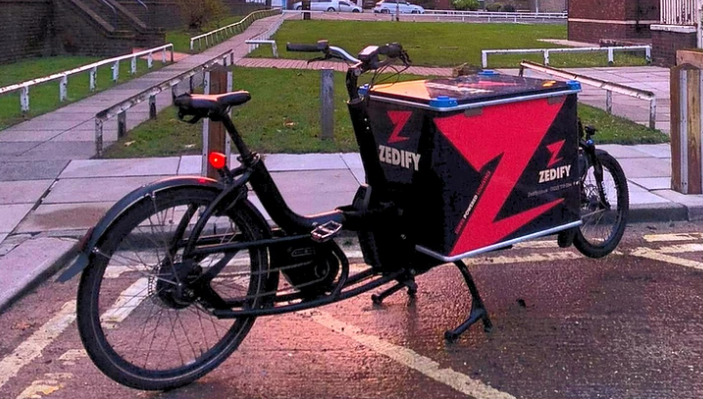The last mile delivery market has evolved dramatically during the last decade. As companies focus their attention on how they can make it greener and more efficient, cargo bikes have increasingly become a preferred method. In the UK, Zedify has already proved that bike deliveries are a valuable option and customers are ready to embrace them.

‘Cargo bikes and edge-of-city-centre consolidation hubs allow us to consolidate deliveries and provide an urban logistics service that is more efficient,’ begins one of Zedify’s co-founders, Sam Keam. The company was launched when Keam and co-founder, Rob King, merged their companies, which were both delivered by cargo bikes in Brighton and Cambridge, respectively. The goal was to scale up a service network that could provide a solution to multiple problems including emissions, congestion, capacity, and labour standards.
The company is operated as a franchise with a national team that develops the sales and marketing strategy, technology, and training and infrastructure. Zedify focuses on three areas with the main one being last mile delivery. Parcels and goods are brought to a hub where they are remoded onto lower emission vehicles, primarily cargo bikes but also electric vans. The goods can range from parcels, office supplies, event support, food, medical products or documents. Zedify also provides first mile logistics by collecting parcels within the city that are then consolidated in their hubs and injected into national carrier partners for next-day national and international delivery.
READ MORE FROM THE LOGISTICS POINT FEBRUARY EDITION NOW!
Riders also collect batteries, recycling materials, e-commerce returns and more, ensuring that their microhubs act as gateways for reverse logistics as well as last-mile. Zedify is integrated with several carrier networks and local customers are able to book next day national services through their platform.
Added value
Due to its business model Zedify doesn’t directly compete with large couriers and looks at how it can provide additional value. ‘Customers aren’t paying because it is green,’ Keam explains. The added value is in being able to book predefined two-hour slots, enhanced customer service and much better doorstep experience at delivery.
Efficiency is built by consolidating freight and then designing routes that will bring the cost per delivery down. As the network and volumes grow the company is able to add on more savings.
The type of customers vary from city to city. In Brighton, for example, the company reflects the strength of the local food economy. In Cambridge a lot of the deliveries are related to the professional services and the science and technology cluster.
A number of locations work with local authorities to deliver public logistics contracts. Franchises are focused on winning local customers, whereas the central team is working with national carriers and retailers. The team targets several areas of e-commerce like subscription, healthcare, wholesale food, parcels, local authorities, print, etc.
‘We find that a lot of the work we do in local areas cannot be easily sent through a national courier,’ Keam says. Zedify is more flexible and can deliver at a specific time window and provide specific handling requirements.
Barriers to success
According to Keam the lack of high quality cycle infrastructure in the UK is not a major challenge for commercial cargo bikes. Because of their size, the company has found that drivers are more careful and give enough space. The biggest advantage is that cargo bikes can use infrastructure that is unavailable to vans and other larger vehicles, providing more direct routes and faster delivery times. In Keam’s opinion the future will be of urban micro-fulfilment centres where cities will move away from using large trucks to deliver small parcels. He believes the costs associated with switching to a more sustainable and urban friendly mode of delivery pay off in the long run. ‘I can see a future where over 50% of deliveries in cities are done by cargo bikes or another lighter vehicle.’ For this to happen, Keam says there is a need for more ambitious policies that support the transition to more sustainable business models.✷
READ MORE:

